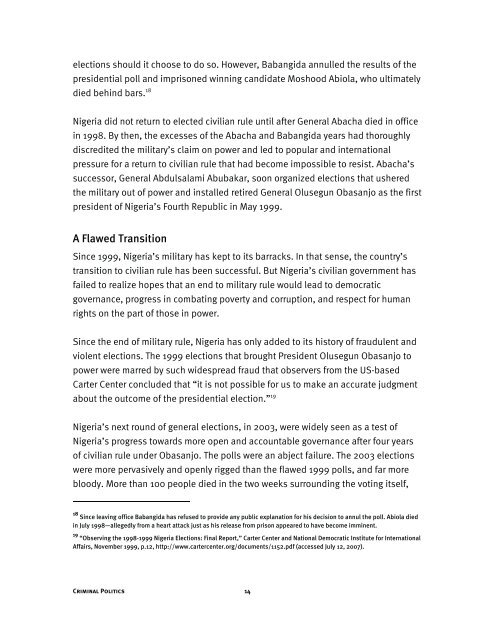Criminal Politics: Violence, âGodfathersâ and Corruption in Nigeria
Criminal Politics: Violence, âGodfathersâ and Corruption in Nigeria
Criminal Politics: Violence, âGodfathersâ and Corruption in Nigeria
You also want an ePaper? Increase the reach of your titles
YUMPU automatically turns print PDFs into web optimized ePapers that Google loves.
elections should it choose to do so. However, Babangida annulled the results of the<br />
presidential poll <strong>and</strong> imprisoned w<strong>in</strong>n<strong>in</strong>g c<strong>and</strong>idate Moshood Abiola, who ultimately<br />
died beh<strong>in</strong>d bars. 18<br />
<strong>Nigeria</strong> did not return to elected civilian rule until after General Abacha died <strong>in</strong> office<br />
<strong>in</strong> 1998. By then, the excesses of the Abacha <strong>and</strong> Babangida years had thoroughly<br />
discredited the military’s claim on power <strong>and</strong> led to popular <strong>and</strong> <strong>in</strong>ternational<br />
pressure for a return to civilian rule that had become impossible to resist. Abacha’s<br />
successor, General Abdulsalami Abubakar, soon organized elections that ushered<br />
the military out of power <strong>and</strong> <strong>in</strong>stalled retired General Olusegun Obasanjo as the first<br />
president of <strong>Nigeria</strong>’s Fourth Republic <strong>in</strong> May 1999.<br />
A Flawed Transition<br />
S<strong>in</strong>ce 1999, <strong>Nigeria</strong>’s military has kept to its barracks. In that sense, the country’s<br />
transition to civilian rule has been successful. But <strong>Nigeria</strong>’s civilian government has<br />
failed to realize hopes that an end to military rule would lead to democratic<br />
governance, progress <strong>in</strong> combat<strong>in</strong>g poverty <strong>and</strong> corruption, <strong>and</strong> respect for human<br />
rights on the part of those <strong>in</strong> power.<br />
S<strong>in</strong>ce the end of military rule, <strong>Nigeria</strong> has only added to its history of fraudulent <strong>and</strong><br />
violent elections. The 1999 elections that brought President Olusegun Obasanjo to<br />
power were marred by such widespread fraud that observers from the US-based<br />
Carter Center concluded that “it is not possible for us to make an accurate judgment<br />
about the outcome of the presidential election.” 19<br />
<strong>Nigeria</strong>’s next round of general elections, <strong>in</strong> 2003, were widely seen as a test of<br />
<strong>Nigeria</strong>’s progress towards more open <strong>and</strong> accountable governance after four years<br />
of civilian rule under Obasanjo. The polls were an abject failure. The 2003 elections<br />
were more pervasively <strong>and</strong> openly rigged than the flawed 1999 polls, <strong>and</strong> far more<br />
bloody. More than 100 people died <strong>in</strong> the two weeks surround<strong>in</strong>g the vot<strong>in</strong>g itself,<br />
18 S<strong>in</strong>ce leav<strong>in</strong>g office Babangida has refused to provide any public explanation for his decision to annul the poll. Abiola died<br />
<strong>in</strong> July 1998—allegedly from a heart attack just as his release from prison appeared to have become imm<strong>in</strong>ent.<br />
19 “Observ<strong>in</strong>g the 1998-1999 <strong>Nigeria</strong> Elections: F<strong>in</strong>al Report,” Carter Center <strong>and</strong> National Democratic Institute for International<br />
Affairs, November 1999, p.12, http://www.cartercenter.org/documents/1152.pdf (accessed July 12, 2007).<br />
<strong>Crim<strong>in</strong>al</strong> <strong>Politics</strong> 14

















